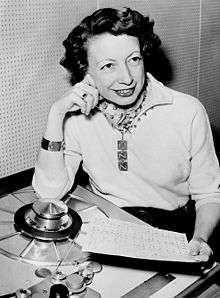Ann Ronell
| Ann Ronell | |
|---|---|
 Ann Ronell | |
| Background information | |
| Birth name | Ann Rosenblatt |
| Born |
December 28, 1906 Omaha, Nebraska, United States |
| Died |
December 25, 1993 (aged 86) New York City, New York, United States |
| Occupation(s) | Lyricist, composer |
Ann Rosenblatt, known as Ann Ronell (December 28, 1906 or 1908 — December 25, 1993) was an American composer and lyricist best known for the jazz standard "Willow Weep for Me" (1932).
Early life
Ronell was born in Omaha, Nebraska on December 28, 1906 (some sources list 1908) to Morris and Mollie Rosenblatt. Ronell graduated from Omaha's Central High School in 1923. She enrolled in Wheaton College, Massachusetts, but transferred after her sophomore year to pursue a more serious music education.[1] She graduated from Radcliffe College, where she studied music with Walter Piston.[2] While at Radcliffe, Ronell wrote music for college plays and contributed reviews and interviews to the school's music publication. After interviewing George Gershwin, she struck up a friendship with the composer, who hired her as a rehearsal pianist for his show Rosalie. It was Gershwin who suggested that she change her name from Rosenblatt to Ronell.
Music career
Ronell was, along with Dorothy Fields, Dana Suesse, and Kay Swift, one of the first successful Hollywood and Tin Pan Alley female composers or librettists. In1929 she put her first song in a show, Down By the River. In 1930, she wrote her first hit, "Baby's Birthday Party." Originally written for a musical, Ronell shopped the song around several music publishers to no avail until Famous Music agreed to publish it.[3] In 1932, she produced the two more songs that gained her notoriety, "Rain on the Roof" and "Willow Weep for Me," the latter of which she dedicated to George Gershwin.
In 1933, Ronell moved to Hollywood. There, she cowrote Disney's first hit song, "Who's Afraid of the Big Bad Wolf?" with Frank Churchill for the cartoon Three Little Pigs (1933). She was notable for being one of the only composers at the time to handle both music and lyrics.[4]
She wrote the lyrics and music for the Broadway musical Count Me In (1942) She wrote songs for movies including Champagne Waltz (1937) and Blockade (1938) and wrote the scores for movies including the Cowan produced The Story of G. I. Joe (1945), the film adaptation of the Weill/Nash musical One Touch of Venus (1948), and the Marx Brothers' Love Happy (1949). She served as musical director for Main Street to Broadway (1953). She was nominated for Best Song, "Linda," and with co-composer Louis Applebaum for Best Score, for her work on The Story of G. I. Joe.
Legacy
Ronell's work scoring films was influential in the field. Her score for The Story of G.I. Joe was the first drama to feature a theme song sung over the credits.[1] She was also the first to produce a record from a film score, which she did with Ladies in Retirement. In 1942, Ronell became the first woman to write both the music and lyrics for a broadway show with Count Me In.
"Willow Weep for Me," Ronell's most famous song, has been recorded by such notable artists as Billie Holiday, Cab Calloway, Louis Armstrong and Ella Fitzgerald, Barbra Streisand, Frank Sinatra, Nina Simone, Nancy Wilson, Dinah Washington, Ray Charles, Lena Horne, Julie London, Tony Bennett, and Sarah Vaughan.
Family
She married producer Lester Cowan. The couple had no children.
Significant songs
- "Baby's Birthday Party" (1930)
- "Rain On The Roof" (1932)
- "Willow Weep for Me" (1932)
- "Who's Afraid of the Big Bad Wolf?" (1933)
Work on Broadway
- Count Me In (1942) - revue - composer and lyricist
- The Crucible (1953) - play - composer for the "Lullaby"
- Blues in the Night (1982) - revue - featured songwriter for "Willow Weep for Me"
References
- 1 2 Benjamin Sears, "Ann Ronell", American National Biography Online, 2000
- ↑ "Five women songwriters who helped shape the sound of jazz | OUPblog". Blog.oup.com. Retrieved 2016-09-25.
- ↑ Tighe E. Zimmers (2009). Tin Pan Alley Girl: A Biography of Ann Ronell. McFarland & Co. ISBN 978-0786439058.
- ↑ Steve Huey, "AllMusic"
External links
- Ann Ronell Papers, the composer's personal papers in the Music Division of The New York Public Library for the Performing Arts
- Ann Ronell at the Internet Broadway Database